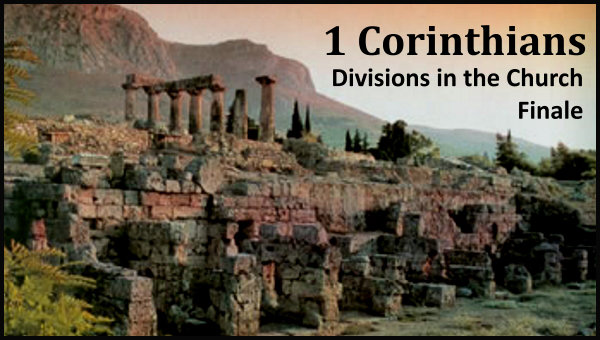By Tyson Thorne

Do Not Go Beyond What is Written, 4.6-.7
Paul concludes this section of his letter by explaining why he has used himself and Apollos as examples. Both of them have applied (literally been transformed by) a truth the believers of Corinth need to follow: “Do not go beyond what is written.” He has already detailed that he taught nothing but Christ crucified, though by doing so he was thought a fool by some. If the Corinthians were to mature they would have to get over themselves and become fools for Christ, just like Paul and Apollos. By heeding this initial warning, to not go beyond the Bible, they will stop taking pride in the leader they follow and instead take pride in following the Word of God. These verses put on display the Corinthian ineptitude in following Biblical standards. Of course if one is to follow a standard it follows that they must know the standard. Apparently, they were more concerned with their own importance than they were with the Bible’s.
Verse seven is a list of questions the author uses to press his point. “What makes you different from anyone else?” All people are equal, there is none “better” than another, no Christian “more saved” than another. Yet we, like our Corinthian ancestors, take credit for our accomplishment as if it were achieved by our own merits. If the greatest boast a man can make is that he knows God (1.31), and even this is not because of anything he has done (1.30), then what merit do we have? Yet we cling to our “great accomplishments” by recognizing how much better we are than others. Like the Corinthians we boast about the size of our church, the architecture of the building, the number of converts made, the growth curve of attendance and the number of hours the pastors work each week. Are not all these things by God’s grace, gifts from our heavenly father? Then why do we act as though we were responsible?
Expect Suffering and Hardship (4.8-.13)
In the next few verses we see examples of Paul’s mastery of sarcasm, and the mistaken triumphalism of the Corinthian believers. Though they thought themselves to be kings, Paul compares them to gladiators – those expected to fight and lose to the lions. He presses the point by contrasting their belief in their own wisdom, their own strength and their own honor with the disciples’ admission of foolishness, weakness and dishonor. The apostles suffer many hardships, including hunger, thirst, lack of proper clothing, being beaten and homeless. The Christians of Corinth should expect no less. He concludes this warning by comparing himself to one cast aside by high society stating:
“We have become the scum of the earth, the refuse of the world.”
The lesson for us is clear: persecution is not something we boast in, nor is it something we avoid, it is instead something that is inevitable. Remember the division of the modern church we identified earlier (Isolationists, who fear being tainted by the world and so do not interact with it, and World Partners who fear being rejected by the world and so compromise themselves). The correct understanding could rightly be named Outlanders, those who do not fear the world for any reason and who view persecution as the natural result of living boldly and lovingly for Jesus Christ. This is not a mediating position. In fact, Isolationists and World Partners have more in common with each other than they do with Outlanders, but that is another study.
Obey and Live Like Your Spiritual Father (4.14-.17)
After clarifying his intent is to warn them rather than shame them, Paul then exhorts them to imitate their spiritual father (himself) rather than their “guardians” (local church leaders). The term translated “guardians” in the NIV is pedagogue, a servant in charge of getting his masters children to and from school safely. In first centurey Roman culture, a father would teach his children his trade, so that they may follow in his footsteps. Paul is warning them that while the other church leaders may be helpful,like a pedagogue, they should follow in his footsteps like Timothy had. In fact, Timothy had become so connected to Paul and his teachings that Paul sent him to Corinth in his stead, with full confidence. They were to follow in Timothy’s steps until Paul could arrange to visit them personally.
This is important for every Christian. Christians must compare what their leaders teach to the Bible. No one is infallible, and it is better to follow the Bible than it is to follow a human leader who is prone to error.
Expect Discipline from Your Spiritual Father (4.18-.21)
This fourth and final warning is built on the third. Evidently, many disregarded Paul’s authority since he did not stay with them and had not returned to them. To avoid misunderstanding Timothy’s appearance as a “stand in” for Paul, he clearly states his intention to visit them. Whether he comes to discipline or to commune with a loving and gentle spirit depends on their response to Timothy and the letter.
We too can expect to suffer discipline if we do not follow the Bible’s teachings. Sometimes we will suffer the discipline of the Lord (the subject of Jude and Hebrews 12), other times the discipline of the church (Matthew 18) which has God’s full approval. We must give careful consideration to what we believe and what we do. Christianity is not a matter of talk, but of power.
|
|